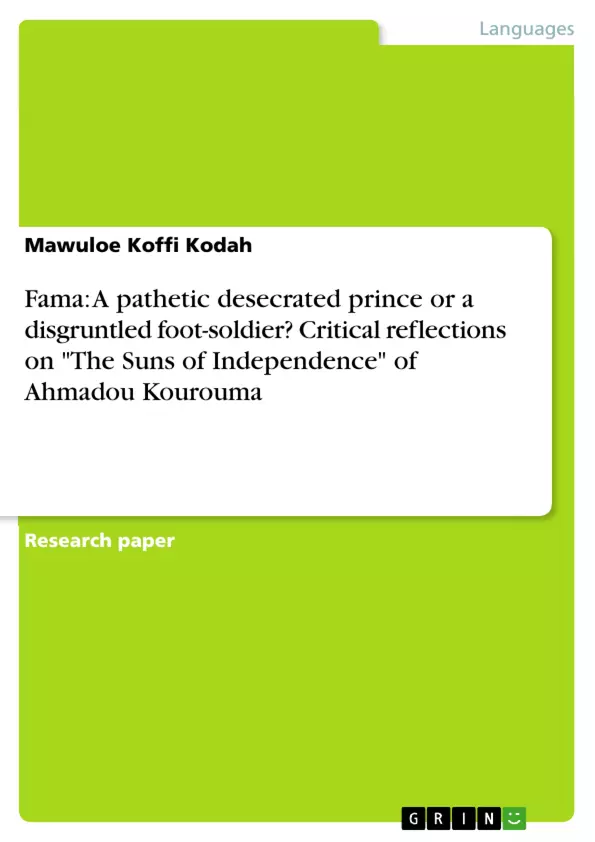This paper examines the character of Fama, the protagonist in The Suns of Independence of Ahmadou Kourouma, as an exact replica of a foot-soldier in contemporary Ghanaian socioeconomic and political development. In this regard, it draws a parallelism between the character of Fama and a foot-soldier and makes recommendations for the way forward in order to sustain socioeconomic and democratic development.
Consequently, the study draws attention to issues relating to political fanaticism and their accompanying tragic disenchantment for unsuspecting self-seeking citizens in emerging multiparty democratic states in developing countries such as Ghana. In the light of the inherent dangers in self-seeking political activism as seen in the character of Fama, for that matter, in that of foot-soldiers, the study recommends steps that will help sanitize political activities and democratic practice in Ghana, and Africa as a whole.
Inhaltsverzeichnis (Table of Contents)
- ABSTRACT
- INTRODUCTION
- Who is Fama?
- Fama and the Foot-Soldiers
- Fama and the ‘Suns of Independence’: A New Breed of Politicians in Africa
- Fama and Foot-Soldiers
- CONCLUSION
- REFERENCES
Zielsetzung und Themenschwerpunkte (Objectives and Key Themes)
This paper aims to analyze the character of Fama, the protagonist in Ahmadou Kourouma's novel, The Suns of Independence, as a representation of a foot-soldier in contemporary Ghanaian socio-economic and political development. The paper draws parallels between Fama's character and the concept of a foot-soldier, exploring the implications of this comparison for achieving sustainable socioeconomic and democratic development.
- The impact of political fanaticism on individuals and societies in emerging democracies
- The consequences of self-seeking political activism in developing countries
- The role of language and style in shaping narrative and identity in African literature
- The challenges of transitioning from colonialism to independence in Africa
- The complexities of identity and belonging in a rapidly changing social and political landscape
Zusammenfassung der Kapitel (Chapter Summaries)
The text begins by introducing Fama, the last legitimate prince of the Dumbuya dynasty, and his ambivalent status following the country's independence. The text highlights Fama's devaluation as a blue-blooded character and his transformation from a respected prince to a scavenger driven by personal gain. The text explores Fama's propensity for anger and insulting behavior, contrasting his actions with the virtues associated with his aristocratic lineage. The text also examines the phenomenon of "foot-soldierism" in contemporary Ghanaian political discourse, drawing comparisons between Fama's character and the actions of foot-soldiers. The study establishes similarities between Fama and foot-soldiers in their motivations, behaviors, and activities. The text further explores Fama's status as a lost soul, a declining prince in search of self-identity in a drastically transformed society. The text highlights the similarities between Fama's plight and the circumstances faced by foot-soldiers in contemporary African democracies.
Schlüsselwörter (Keywords)
This paper examines key concepts related to postcolonial African literature, political fanaticism, foot-soldierism, identity, social change, and the complexities of navigating a rapidly changing socio-political landscape in Africa. The paper explores themes of disillusionment, the consequences of self-serving political activism, and the challenges of transitioning to a new era of independence. The study also analyzes the importance of language and style in shaping narratives and identities within African literature.
- Quote paper
- Mawuloe Koffi Kodah (Author), 2012, Fama: A pathetic desecrated prince or a disgruntled foot-soldier? Critical reflections on "The Suns of Independence" of Ahmadou Kourouma, Munich, GRIN Verlag, https://www.hausarbeiten.de/document/188642


